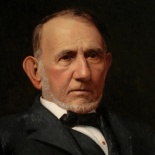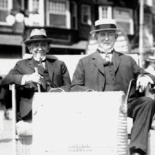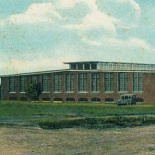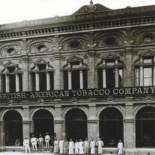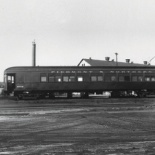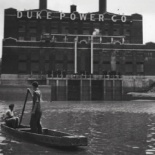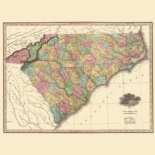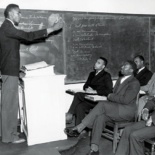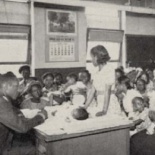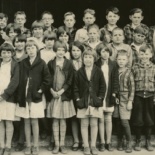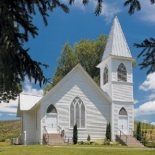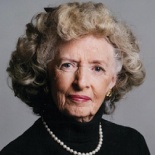Tracing Our Philanthropic Roots
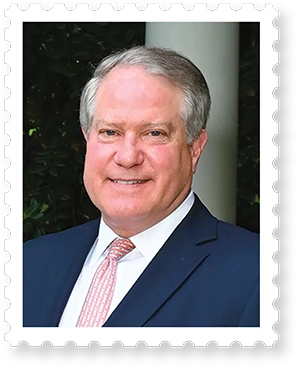
Reflections by
Charles C. Lucas III Board ChairAs Chairman of the Board of Trustees, it has been my honor to help lead the celebration of The Duke Endowment’s 100th anniversary. Our centennial theme, “Committed to the Carolinas,” speaks to the Endowment’s enduring mission to support North Carolina and South Carolina as instructed by our founder, James B. Duke. It is impossible to understand that commitment fully without knowing why Mr. Duke and his family felt so strongly about giving back to this region.
When the Civil War ended in 1865, his father, Washington Duke, walked home to his hardscrabble farm near Durham. A Unionist who had been conscripted into the Confederate Army, he had few assets beyond the coins in his pocket and some dried tobacco in the barn. With help from sons Benjamin Newton, James Buchanan (“Buck” for short) and daughter Mary, Washington Duke processed that dried tobacco and began selling it off the back of a wagon as “Duke’s Mixture.” W. Duke, Sons and Co. was born.
As the company grew, the Dukes invested in the Bonsack cigarette manufacturing machine and pioneered the mass production of cigarettes. It propelled their firm to the top of the nation’s smoking tobacco market. The Dukes built a factory in New York, and Buck Duke, then just 32, orchestrated one of the greatest business combinations in history by pulling the largest American tobacco manufacturers together into the American Tobacco Company. A similar arrangement in England placed him at the head of the British-American Tobacco Company. American Tobacco was the world’s largest tobacco conglomerate until a 1911 antitrust ruling by the U.S. Supreme Court split the companies.
With his brother and business partner Ben at his side, Mr. Duke had begun to invest in textiles, railroads and banks in the early 1900s. Yet, it was the brothers’ big bet on the still-developing hydroelectric power sector that produced a second fortune in the form of the Southern Power Company — later Duke Power, today’s Duke Energy.
The family’s significant economic success provided the means for wide-reaching philanthropy across the region. Washington Duke, a devout Methodist, had instilled in his children a deep sense of responsibility for giving back to the communities that had enabled them to prosper. Touched by the death of his mother and a brother to typhoid fever, Ben Duke established the family’s pattern of giving to hospitals, the Methodist church and orphanages for orphans and “half-orphans,” as the Duke siblings had been as children. The Dukes also believed in the importance of education, so one of the family’s first significant donations was a gift from Washington Duke to finance the move of a small Methodist school, Trinity College, from Randolph County to Durham, and to provide the school with its first endowment. That first gift to Trinity established a tie between the family and the school, now Duke University, that endures to this day. Notably, at a time of deep discrimination against women and minorities, the Dukes supported many African American hospitals, orphanages and schools, and they were responsible for Trinity opening its doors to women long before other colleges and universities became coeducational.
In December 1924, James B. Duke finalized his Indenture of Trust, the legal document creating The Duke Endowment. The unprecedented gift to the Carolinas was his way of taking the financial profits from the businesses and reinvesting them in the welfare of the people and communities those businesses served. Mr. Duke was a big thinker, a global thinker. When you consider the businesses he built, it was remarkable. Yet he never lost sight of the fact that he was from the Carolinas, and he understood that he would have greater impact if he could concentrate his philanthropic efforts on a limited geographic region. He applied his vision to this grand gift that he hoped and believed would help the people of the Carolinas. The areas he selected to support were the same areas supported by the family and established by his brother, Ben, over the previous 35 years — health care, children and families, the church and higher education. Each remains incredibly relevant in our world today.
Washington Duke — my great-great-great-grandfather — and his sons, Benjamin Newton Duke and James Buchanan Duke, laid the foundation for the philanthropic vision that lives on today through The Duke Endowment. For 100 years, the Endowment has been supporting grantees who nurture children, promote health, educate minds and uplift spirits.
My grandmother, Mary Duke Biddle Trent Semans, served as Chair of The Duke Endowment for 19 years and as a Trustee for 55 years. She taught us many things, but certainly one of the most important was what a great privilege and responsibility it is to serve and participate in philanthropic work to support the people of the Carolinas. I can tell you, in no uncertain terms, it is the honor of a lifetime to play a small role in my family’s legacy and to be a part of the Endowment’s ongoing work.

Charles C. Lucas III, Board Chair The Duke Endowment
Duke Family Legacy
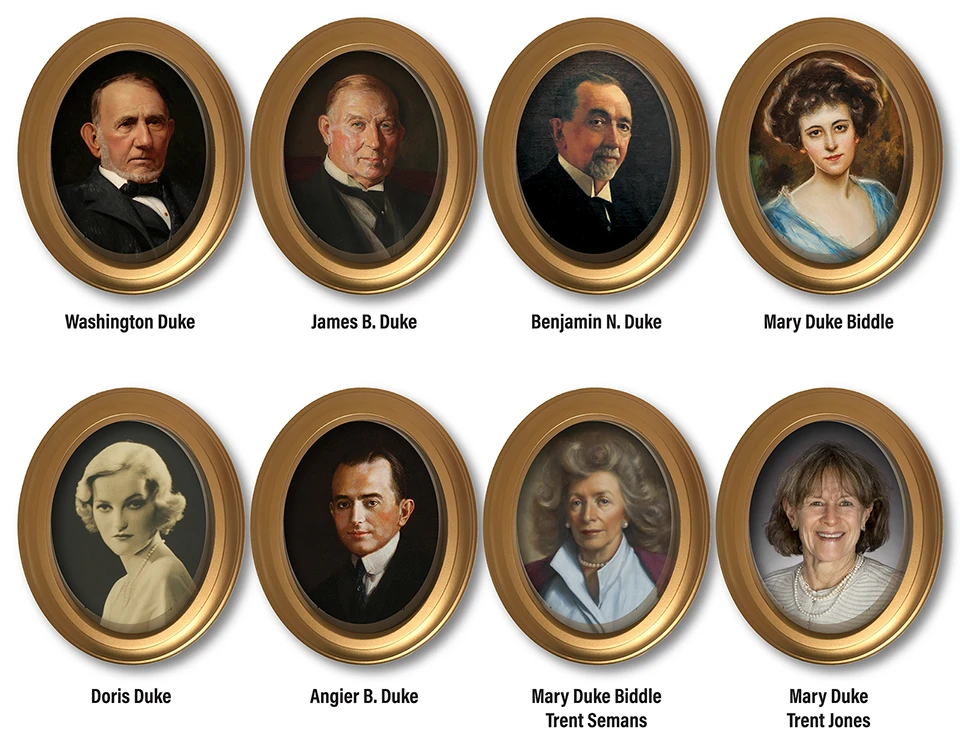
Generations of Leadership
The late Mrs. Semans (above), granddaughter of Benjamin N. Duke and grandniece of James B. Duke, carried the family’s philanthropic legacy into the 21st century. She was the first woman to chair the Endowment’s Board of Trustees, and she helped lead the organization for more than 50 years. One of her grandsons, Charles C. Lucas III (below, left), serves as Board Chair. Another grandson, J. Trent Jones (right), is a Trustee. Her daughter, Mary Duke Trent Jones (above), is a Trustee Emerita.
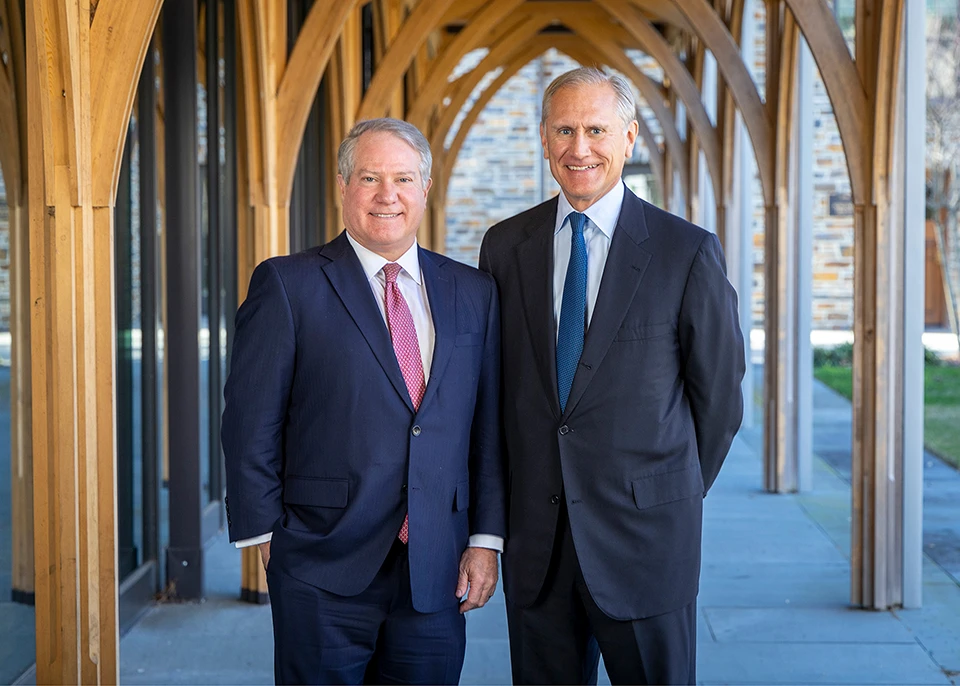
They came up out of the grinding poverty that followed the Civil War. They lived through a period of intense sectionalism and bitterness, but the character of all of them came out untouched by these fires of adversity. They refused to live in a dead past or blindly to conform to the traditions of that past. They were quick to realize that the war was over and that there was a new day in the South. They had the vision to see this new day and the courage to live in the light of it. This often brought them into conflict with local sentiment. But they went on, and they were always patient and tolerant of others. In their business, their friendships, their gifts, they knew no distinctions as to religion, politics, race or social class. They had many obstacles to overcome, but they succeeded in their great undertakings. They not only called us to better things, but they showed us the way.
William Preston Few
President, Duke University, 1910–40
Speaking about the Duke family at the memorial service for Benjamin N. Duke, January 24, 1929
